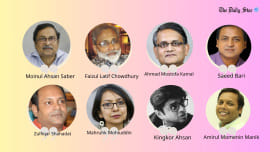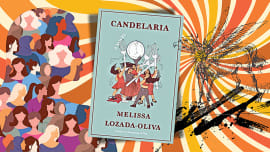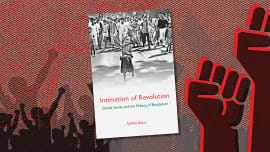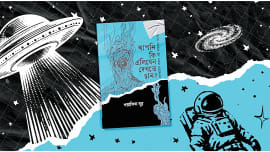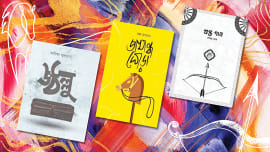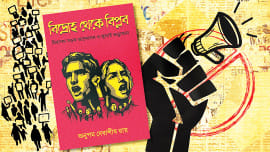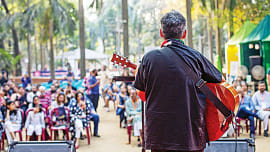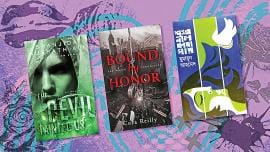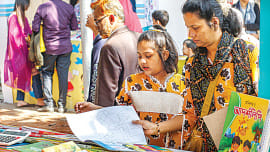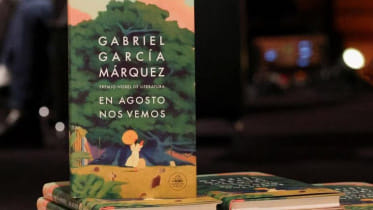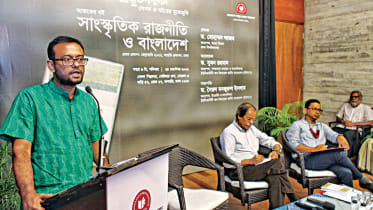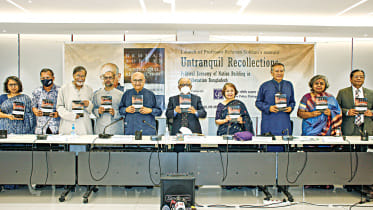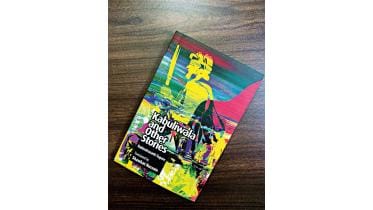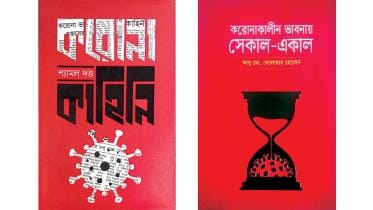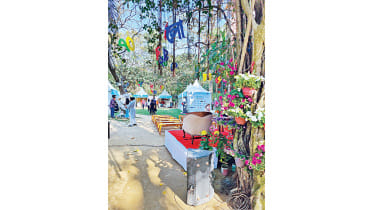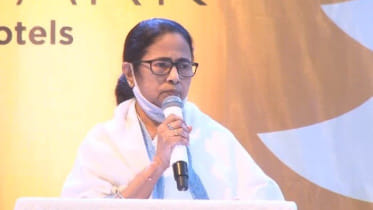An Ekushey Book Fair breaking with tradition
21 September 2025, 13:05 PM
Books & Literature
BOOK REVIEW: FICTION / An outlandish jumble of cults, cannibalism, and colonial violence
19 March 2025, 18:00 PM
Books & Literature
BOOK REVIEW: NONFICTION / The making of Bangladesh in the global sixties
19 March 2025, 18:00 PM
Books & Literature
BOOK REVIEW: FICTION / ‘Apni Ki Alien Dekhte Chan?’: A debut with immense possibility
12 March 2025, 18:00 PM
Books & Literature
ESSAY / 'A terrible beauty is born' in Gaza and West Bank
12 March 2025, 18:00 PM
Books & Literature
THE SHELF / Literature thrives beyond the centre too
5 March 2025, 18:00 PM
Books & Literature
BOOK REVIEW: NONFICTION / From protests to power: The journey to Bangladesh’s July Uprising
5 March 2025, 18:00 PM
Books & Literature
EVENT REPORT / Celebrating diversity and language at “Bhasha Utshob 2025”
26 February 2025, 18:00 PM
Books & Literature
ESSAY / Between tradition and taboo: The arranged marriage trope in Bangla dark romance literature
26 February 2025, 18:00 PM
Books & Literature
BOI MELA 2025 / 5 books to look out for at this year’s Boi Mela
19 February 2025, 18:00 PM
Books & Literature
An outlandish jumble of cults, cannibalism, and colonial violence
Melissa Lozada-Oliva takes us on a bumpy apocalyptic horror ride in her debut novel Candelaria. Spanning across three generations of women, the novel ushers together an unsettled past and an even more bizarre present.
19 March 2025, 18:00 PM
The making of Bangladesh in the global sixties
“Mr Speaker Sir, what did Bangalee intend to achieve? What rights did Bangalee want to possess? We do not need to discuss and decide on them now [after independence]. [We] tried to press our demands after the so called 1947 independence. Each of our days and years with Pakistan was an episode of bloodied history; a record of struggle for our rights,” said Tajuddin Ahmad on October 30, 1972 in the Constituent Assembly. He commented on the proposed draft constitution for Bangladesh, which was adopted on November 4, 1972.
19 March 2025, 18:00 PM
Literature thrives beyond the centre too
“All literature is regional; or conversely, no literature is regional”—is a common sentiment to have today, but I had first read those lines from Joyce Carol Oates, in her preface to a book of stories by one of Canada’s most gifted storytellers, Alistair MacLeod. In MacLeod’s short stories, his Cape Breton Island was a refrain through which the momentous lives of his ordinary characters came through.
5 March 2025, 18:00 PM
From protests to power: The journey to Bangladesh’s July Uprising
Over the past couple of decades, Bangladesh has witnessed three significant social and political movements that have shaped the course of its history.
5 March 2025, 18:00 PM
Celebrating diversity and language at “Bhasha Utshob 2025”
Gulshan Society held a two-day language festival at the Gulshan Lake Park, curated by Sadaf Saaz and Jatrik. The event took place over the weekend of 21-22 February that saw discussion panels, original musical performances, and poetry recitations, surrounded by an array of book stalls and food courts.
26 February 2025, 18:00 PM
Between tradition and taboo: The arranged marriage trope in Bangla dark romance literature
Disclaimer: This article is for informational purposes only and does not endorse or condone any form of abuse or exploitation.
26 February 2025, 18:00 PM
5 books to look out for at this year’s Boi Mela
Whether you’re searching for contemporary works by emerging writers or timeless classics from renowned authors, this list highlights must-read books that deserve your attention during your visit.
19 February 2025, 18:00 PM
Personalistic authoritarianism and Bangladesh: Reading Ali Riaz’s ‘Ami E Rashtro’
Bangladesh has suffered the terrible luck of having to deal with authoritarianism several times since its inception, most recently under the Awami League from 2009 to 2024.
19 February 2025, 18:00 PM
New Garcia Marquez novel launched 10 years after his death
Gabriel Garcia Marquez died a decade ago, but a previously unpublished book by the author who popularised the Latin American "magical realism" narrative genre will hit the stores on Wednesday, somewhat despite his wishes
6 March 2024, 12:13 PM
Jhumpa Lahiri’s Italian renovations
Jhumpa Lahiri has always been the rare author whose prowess in the art of the short-story far surpassed her novelistic talents.
3 January 2024, 18:00 PM
Irish author Paul Lynch wins 2023 Booker Prize
Irish author Paul Lynch won the 2023 Booker Prize for fiction on Sunday for his novel "Prophet Song," a dystopian work about an Ireland that descends into tyranny
27 November 2023, 04:56 AM
Amar Ekushey Boi Mela: Fun day for the little ones
Shankha Saha was having too much of a good time to pay heed to his father..The seven-year-old was busy moving around the book fair at Suhrawardy Udyan this morning..Meanwhile, his father Shantanu Saha not only had to keep an eye on him, but also buy him books from the Sisimpur stall.
3 February 2023, 15:53 PM
‘We must celebrate books’
There is an absence of the type of education in the country that encourages people to involve in knowledge-based discussions, said eminent educationist Prof Syed Manzoorul Islam.
25 September 2022, 18:00 PM
Attack fans interest in Rushdie works, mainly “Satanic Verses”
The stunning knife attack on author Salman Rushdie has fanned interest in his works - above all, The Satanic Verses, which left him living for years under a looming death threat.
14 August 2022, 05:48 AM
A glimpse into post-Liberation War challenges
War-ravaged, Bangladesh faced crucial challenges centring nation building just after its birth.
9 April 2022, 18:00 PM
Kabuliwala and Other Stories: A NOTEWORTHY VENTURE IN THE FIELD
Kabuliwala and Other Stories is a collection of twelve outstanding stories of Rabindranath Tagore, translated into English by Prof Shawkat Hussain, a former professor of the Department of English, University of Dhaka.
8 April 2022, 18:00 PM
Pandemic has left its mark
With the Covid-19 pandemic engrossing almost every aspect of human lives in the last two years, literature was not excluded from these extraordinary effects as well. Writers were engulfed with new connotations and realisations, and that’s what influenced their works immensely, be it fiction or non-fiction.
9 March 2022, 18:00 PM
All things book
“Curating books in Bangladesh is an especially rich endeavour, because we have two languages and our own publishing world. A proper bookstore would want to cover everyone and all of this,” said Amina Rahman, managing director of Bookworm Bangladesh.
6 March 2022, 18:00 PM
'West Bengal-Bangladesh ties can't be measured with a tape'
Inaugurating the Kolkata International Book Fair yesterday, Mamata Banerjee said she is happy that Bangladesh is the theme country at the 45th edition of the fair, on the 50th year of its liberation.
1 March 2022, 06:56 AM
Mithila’s new book now available for pre-order
Renowned actress Mithila had launched the series, “Ayra ar Maa er Obhijan”, highlighting the travels, adventures and friendship that she shares with her daughter, Ayra.
24 February 2022, 18:00 PM
